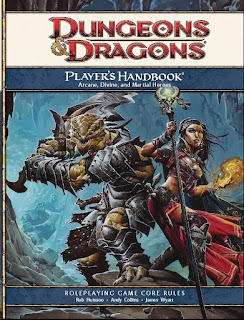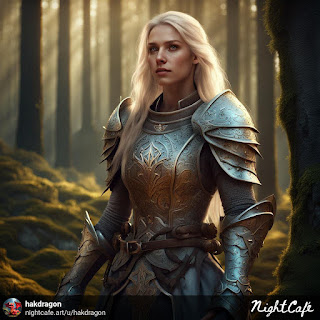I have always felt a limiting factor in my actions whenever I play D&D. This is especially true with the newer game versions, where I stare at a character sheet and a "list of powers and spells."
What do you do this turn?
I don't know. What powers do I have?
The question would be the same in older game editions; my answer would be either attack, cast a spell, or something else. The older versions were better because your options were more limited, and you had more room to improvise and create crazy strategies. This is also like GURPS, where you have a list of skills, ability scores, maybe some magic, and anything goes.
But between adventures, what drives me when I think about my character? Of course, the story, but there is that XP chart. The next level of powers is coming up, and my gold pieces drive me. What motivates me in any version of D&D is power and attaining it. It is always there, hovering over my choices, driving me forward, and controlling my decisions.
Our party will be in town for a week, what do we do?
Wander around the wilderness and find a dungeon. Hope some scenario comes up in town with combat and treasure. Go somewhere and do violence on some evil humanoids.
You look at almost any mega-dungeon module, and this is the base motivation of most D&D games: clean the map, get the loot, and rack up as many XP as possible to unlock incredible powers. These are easy motivations, so the game is popular.
But I don't really care about killing rooms full of evil humanoids. I keep trying these games and get the "pulp swords and sorcery vibe" (one that the newer editions of the game have abandoned for cosplay), but none last long. That level chart feels like something I will never attain and nothing I really wanted in the first place. Who cares what some Seattle game designer made happen at level three? It is cool compared to the last two levels, but it gets to be the same.
The higher I go in levels, the more limited my choices feel to what the game designers give me. The higher I go, the worse it gets, and the more my actions are limited until choice paralysis sets in at level eight, and the characters become unplayable (in terms of being able to think outside the character sheet).
GURPS feels different. What do we do if we are in that town for a week?
Wow, anything.
Some may look at their skill list and say, "What next?" I look at it and ask myself, "Can I get training?" Could I learn a new skill? Can I earn a wage somewhere? Is there a new skill I want to learn? Are there problems in town my skills can help with? Can I earn money by entertaining, smithing, making maps, leatherworking, skinning, or any other trade I have worked on?
Do I have the social skills and languages to communicate with different factions in town? What can I find out? Is there some history to learn here? If we are into dungeon crawling, do we research local lore and find the place ourselves without having to randomly wander into it? In a mega-dungeon adventure, typically, you wander hexes, and the referee has you "find the hole in the ground" when you walk in the hex, just to keep things moving. In GURPS, my party is hitting the books, reading journals, asking people in town, and putting the clues together to "find the place where the lone tree stands at the meeting of the two rivers and 300 paces from the confluence to the west is the lost crypt."
We are working to find this place. When we are there, we look for clues about other places around here. We take rubbings of etchings, pick up scrolls and books, and look at the artwork carved on the walls. A map made by a lost adventuring party or ancients is a treasure.
We are a group actively seeking information and seeking to gather and decipher it. Our skills unlock those doors. We don't have to be "given" anything by an adventure writer or referee; we earn it through sleuthing and history work.
We found that.
Now let's go there and find out more.
This is my turn-off to most of today's fantasy gaming and a massive part of the OSR. Most adventures are written like a TV show; turn your brain off and let the referee "read the shaded story box" or "make you find the next place to keep things moving." Many games do not even allow you to "find that next place" through investigation, collecting clues, and using skills.
If the dungeon is there, you will find it.
If I fail a roll and don't find the place, so what? It does not automatically mean a "dead end," as many of these writers would have you believe. Might as well throw out your books; the party hit a dead end! The game is broken now! They act like they are hitting a dead end, like someone unplugging the television. What do we do now? We can't be entertained! Can't we just "fail forward?"
No, your options have just changed. You must figure out a way forward or find a new place to go. That route is no longer available. Find another way. Or find a new place to go. Solve another problem; this one is blocked.
Failing forward protects systems with limited options where skill and abilities are your only choices, and players aren't allowed to think outside of them. This is the MMO with "action buttons," and that concept protects the game from free thinking and free actions.
If we do not find the crypt, that is a delay or setback, or we must find another place. Maybe it never existed. We may see a new clue later. Failure changes the direction of the narrative; it doesn't stop it. Failing forward is a gimme, an admission the game you are playing can't handle situations out of the normal, and a "fixed story" is more important than player (and referee) freedom.







































